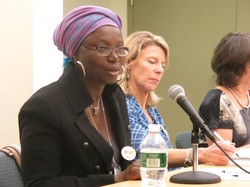By Nancy Neal
 On Friday, March 1, at the United Nations Commission on the Status of Women in New York, Bread for the World and the Presbyterian Church (U.S.A.) co-sponsored a parallel event called 1,000 Days: Improving Nutrition for Rural Women. Other co-sponsors included the Women’s Missionary Society of the AME Church, Franciscans International, the 1,000 Days Partnership, Save the Children, and Family Care International. The effort was coordinated by staff at The Hunger Project. A standing room only crowd of over 100 came out to hear about the importance of maternal and child nutrition in the 1,000 day period between pregnancy and a child’s second birthday.
On Friday, March 1, at the United Nations Commission on the Status of Women in New York, Bread for the World and the Presbyterian Church (U.S.A.) co-sponsored a parallel event called 1,000 Days: Improving Nutrition for Rural Women. Other co-sponsors included the Women’s Missionary Society of the AME Church, Franciscans International, the 1,000 Days Partnership, Save the Children, and Family Care International. The effort was coordinated by staff at The Hunger Project. A standing room only crowd of over 100 came out to hear about the importance of maternal and child nutrition in the 1,000 day period between pregnancy and a child’s second birthday.
The expert panel was moderated by Mary Ellen McNish, president of The Hunger Project. Lucy Sullivan of the Washington, DC-based 1,000 Days Partnership office shared basic information about how critical it is for women and children to have good nutrition in the 1,000 days period from pregnancy to a child’s second birthday. If malnourished, children can suffer permanent cognitive and physical delays, including shorter height, poor eye sight, diminished intellectual capacity, and weakened immune function.
Isatou Jallow, from the Gender Unit at the World Food Programme framed the issue. It is critical for women, particularly women living in rural areas, to have control of land and money because women are responsible for feeding children. And women are more likely than men to invest any profit back into their family.
Carolyn Miles, the first woman to be president and CEO of Save the Children shared about their 2012 Nutrition Report. She highlighted ways in which Save the Children includes nutrition in their programs to address poverty and hunger issues with women and children.
Catherine Bertini, Professor of Public Administration and International Affairs, Maxwell School of Citizenship and Public Affairs at Syracuse University addressed the role of the US government in improving nutrition for women and children. She talked about the Global Health Initiative and Feed the Future, the two flagship programs administered by USAID that address nutrition within the larger context of health and agriculture. She also highlighted the importance of the domestic WIC program, which helps thousand of mothers and young children improve their nutrition.
After the presentations I talked about “1,000 Conversations,” the vehicle that the Women of Faith for the 1,000 Days Movement is using to spread the word about proper nutrition in the 1,000 day window. Women of faith are pledging to have 1,000 conversations in 1,000 days about maternal and child nutrition. It is critical that we spread the word about nutrition and put pressure on our government officials to continue to fund and promote nutrition programs.
Nancy Neal is associate for denominational women’s organization relations at Bread for the World and a member of the Presbyterian Church delegation to the Commission on the Status of Women.
The photo shows Isatou Jallow of the Gender Unit at the World Food Programme speaking at the side event.